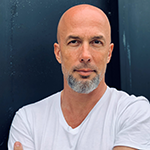APPLY FOR ADMISSION
FIRST YEAR MEISNER ACTING PROGRAM

BEGINS
SEPTEMBER 10TH

Call To Schedule an Interview
(917) 794-3878
The Meisner Acting Technique: A Comprehensive Guide for Actors
Dive into the challenge of professional actor training! Ever felt lost amid countless acting methods? Discover the Meisner Acting Technique—a game-changer in becoming an actor with emotional accessibility.
Beginning with a captivating repetition exercise, the Meisner Technique evolves into an incredibly sophisticated improvisation that instills in the student the fundamentals of acting. This training lays the foundation for actors like you to unleash authentic performances with organic, fully realized human behavior.
Ready to unravel the magic of Meisner? Read on!
Short summary
- The Sanford Meisner Technique or Meisner Technique is an acting method developed in the 1930s by Sanford Meisner and is based on a progressive exercise that teaches the student how to be a consistent, grounded, and emotionally available actor.
- Notable actors have been trained in this technique to create compelling performances.
- It offers numerous benefits but also poses challenges that must be taken into account for optimal results.
The Origins of the Meisner Technique
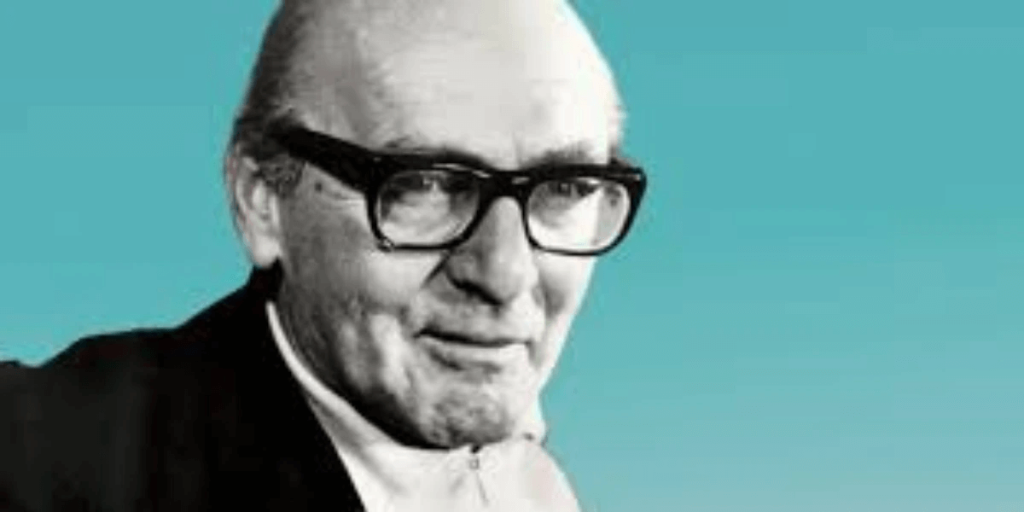
The Meisner Technique, developed by the esteemed acting teacher Sanford Meisner in the 1930s, is grounded in the actors ability to be fully present, in the moment, listening and responding to what is happening. The Maggie Flanigan Studio in New York City is an acting program dedicated to preserving and accurately teaching this acting technique..
Famous actors such as Diane Keaton, James Gandolfini, Philip Seymour Hoffman, Sam Rockwell, and Chadwick Boseman have all expressed their appreciation of how it enabled them to bring out honest performances without the need to dig literally into their past the way Lee Strasberg’s Method requires.
Meisner Training is widely accessible regardless of experience level. It is a fool-proof, creative, and imaginative process for creating behavior, which is the actor’s job.
Core Principles of the Meisner Technique

At the heart of Meisner acting lies a combination of three primary components: the repetition exercise, independent activity, and emotional preparation. In the first year this technique trains the actor to get out of their head, into their heart, and onto their spontaneous impulses. The goal is to act before you think to allow the actor’s authenticity to come to the surface.
Let’s explore these elements to better comprehend how they shape this powerful approach taken by Meisner Technique practitioners:
Emotional preparation is what an actor does off-stage or off-camera in order to relate emotionally to the previous circumstance of a scene. Meisner teaches the actor how to harness the ability to daydream and fantasize in order to self-induce emotion. It is a very important part of the acting process and requires that students become comfortable in handling the full gamut of human emotion.
A serious actor who wants to work on major parts needs to become comfortable processing their rage, joy, heartbreak, jealousy, grief, shame, and humiliation.
Emotional preparation
The Meisner Technique approaches emotional preparation through the imagination. As human beings, we possess the ability to alter our inner life through vivid daydreaming. Have you ever been lost in thought and began daydreaming about losing your pet, or taking revenge on someone who wronged you? These daydreams produce an organic, emotional response in us.
The imagination can take you anywhere, and when used in an artistic process, can be a very powerful tool. This is unlike other acting techniques, particularly Method Acting, which deals with sense memory and emotional recall. The focus on imagination rather than actual lived trauma is a far healthier and more creative way to work. It was the overriding issue that caused Meisner to create this technique. Meisner did not believe an actor needed to relive and muddle through the literal tragedies and torturous personal emotions of their life.
A major part of Meisner’s first year work focuses on teaching the actor how to come to a full life off-stage, and then be able to come on, and listen, respond, and truthfully do. Most actors have a misconception about emotion in acting. This acting technique addresses the understanding that it is the quality of emotion, not the quantity which will make a performance riveting.
In life, we do not try to feel, we do not hold onto emotion, nor do we try to squeeze out more than we have. Emotion is fluid, and it should ebb and flow within the actor. This is not an easy thing to master. It takes months of work to get an actor to leave themselves alone and trust that what they have emotionally is enough.
If an actor also trains their body and voice, their emotional accessibility and ease will make them aesthetically pleasing to watch. An audience is moved when they see human beings who are fully alive struggle to keep themselves together. This takes great skill.
Repetition exercises
The repetition exercise is what the Meisner Technique is most known for. It is introduced on day one and is the first thing that will get an actor’s placement of concentration off of themselves and onto the other person. It is the seed that will unfold in First Year into a sophisticated improvisation.
The beginning repetition exercise starts with two students standing across from each other. Learning how to be still, open, and available to the other person, in contact with them, can be very jolting at first. The bedrock of acting is listening, and the repetition challenges the actor to listen and respond from an organic, inner impulse. It’s a brilliant way to get the actor out of their head.
At no point will a student in Meisner training ever have to think about what to say. When in doubt repeat, and answer responsively. If the two students are working well, the repetition should be lively, spontaneous, and personal. The actors are learning how to respond in every moment from their point of view, in the moment, out of their heads, with freedom and curiosity.
The repetition exercise is the beginning work of sensitizing the actor’s instrument. We are all parented, socialized, and educated, and over decades, we build up walls and guards to keep us safe and a productive member of society.
First Year Meisner training begins to chisel away these blocks so that the student’s vulnerability and empathy can begin to operate. This takes months of hard work. This also requires the student to be direct and truthful. We are rarely truthful in life, but the actor must be able to respond personally in every moment. This requires courage, and a willingness to be truly seen, which is at the core of vulnerability.
Independent Activity
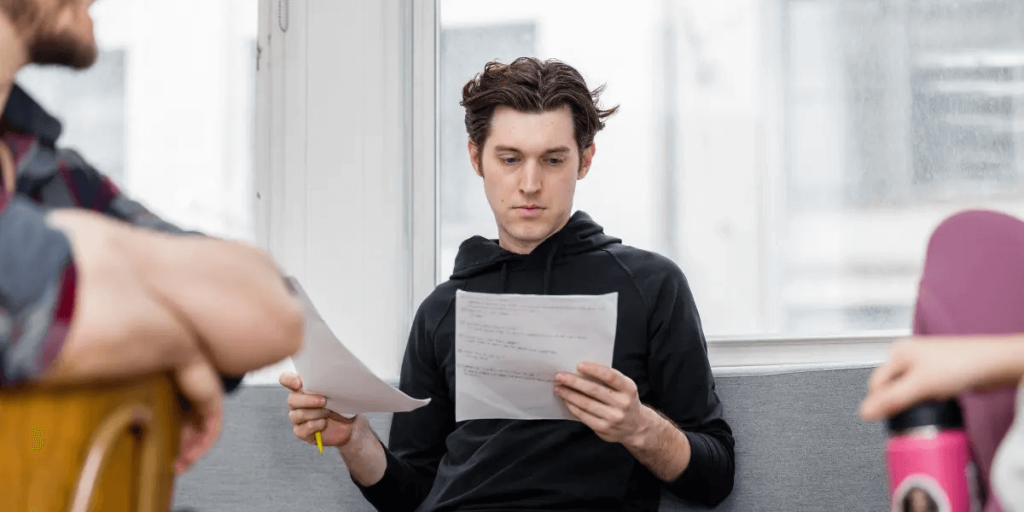
The first year of the Meisner Technique focuses on a sophisticated and structured, improvisation that trains the student in essential fundamentals. With the Independent Activity, the actor learns how to craft. The ability to craft a previous circumstance, an acting relationship, and shared circumstances are part of the actor’s fundamental skill set. Most actors do not know how to do this.
The more simple, specific, and personal an actor can craft, the more vivid their behavior will be. This requires an inviolate sense of truth, a vivid imagination, and a willingness to mine the deepest and most personal parts of ourselves. A first-rate artist is willing to put their soul on the line, and excellent Meisner training should accomplish this.
As Meisner’s exercise unfolds, one student is crafting an independent activity, and the other student is coming to the door. This allows for each actor to work on a different side of their skill set. Learning how to truthfully do under an imaginary circumstance with the independent activity, and continued work on listening and responding at the door, is the core of the training. Meisner created this exercise with the sole intention of bringing these skills to scenes.
Over the course of First Year, there are three rounds of scenes, which will challenge students to apply what they are learning, while also breaking bad habits. This includes adjusting to the text, line readings, waiting for cues, or emotional manipulation in order to fit a line.
Comparing Meisner and Method Acting
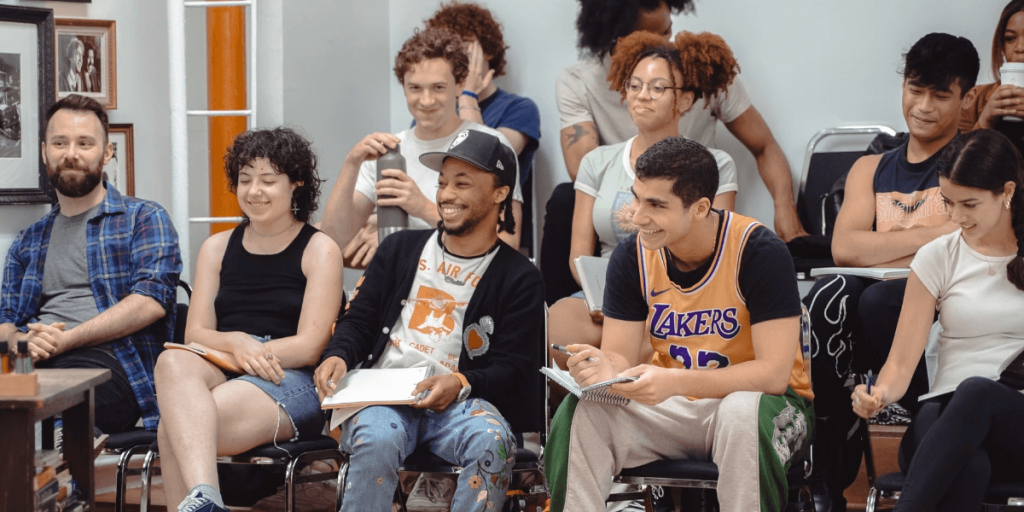
Both the Meisner Technique and Method Acting are widely acknowledged approaches to acting, yet they employ different techniques and overall philosophy. While with the Meisner Approach, actors learn how to use their imagination and ability to daydream, The Method trains actors to go back into their literal past and relive a searing personal moment as an emotional recollection in order to alter their inner life.
Meisner felt, along with many actors in the Group Theater, that this was unnecessary, and ultimately unhealthy and damaging. The imagination is a far healthier and furtive place from which to create.
It is essential then for method actors—as well as all actors alike—to find a training method that works for them. The job of the actor is to create behavior. The best actors do that from an organic, experiential place. Bad actors indicate and perform. If someone is serious about pursuing a serious acting career, finding a process, a way of working that will support them for their entire career is essential. The Meisner Technique has proven to be a full-proof way to do it.
A serious artist masters their instrument. For the actor this includes the body, voice, and imagination. The Meisner Technique, when taught thoroughly and properly, will begin this process. A full acting conservatory program that offers comprehensive training is the best approach.
Notable Actors Trained in the Meisner Technique
The Meisner Technique has trained thousands and thousands of actors over the last 90 years. We have been given incredibly engaging performances thanks to these famous Meisner actors: James Gandolfini, Chadwick Boseman, Robert Duvall, Allison Janney, and Diane Keaton.
Recently celebrated Meisner trained actors like Philip Seymour Hoffman, Timothée Chalamet, Tina Fey, and Sandra Bullock have also trained in the technique.
Since its inception, the Meisner Technique has become an essential resource for aspiring performers looking for a means of creating organic, vivid behavior consistently.
How to Practice the Sanford Meisner Technique
The Meisner Technique is a method of acting, which taught in full requires a two-year commitment. Two classes and two rehearsals a week are essential to put the work together. A serious Meisner program should include two three-hour classes a week, and every student should be working every class with their partner.
It is also important, when looking for a Meisner Studio, to seek out master teachers of the technique, those that have dedicated their professional lives to the art of teaching the Meisner Technique. Most teachers are pulling out notes from classes they took 10 years ago and have no idea how to train actors. Due diligence is important when selecting any kind of acting classes in NYC.
Sanford Meisner once said, “the repetition plays on the source of all organic creativity, that is the inner impulse.” An actor who is out of their head, spontaneous, and fully and freely expressive is going to be a dynamic and vivid presence on stage or screen.
Studying the Meisner Technique
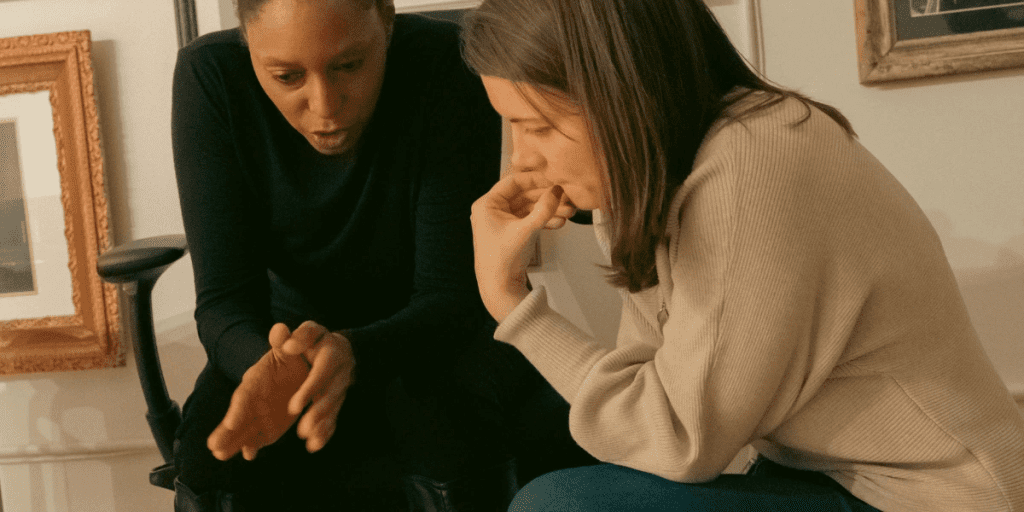
Actors looking to build their knowledge of the Meisner Technique can benefit from a wide range of teaching resources. Maggie Flanigan Studio offers a professional, safe, and nurturing atmosphere with the highest professional standards, to help students become serious, well-trained actors. It is widely regarded as the best Meisner training program in the US and stands out for its commitment to accurately preserving the Meisner Technique.
Many books, such as the popular one co-authored by Meisner and Dennis Longwell, are valuable resources for actors diving into his approach. These sources, in conjunction with schools and workshops like those at the Maggie Flanigan Studio, offer guidance on exploring serious actor training. But it is important to understand that you cannot learn to act by reading a book. Finding an acting studio with master teachers, and supportive and challenging expectations is the best way to train.
With the high standards, focus, and dedication of acting studios like the Maggie Flanigan Studio, access to serious, intensive training and workshops centered on the Meisner Technique is more accessible than ever before.
The Benefits and Challenges of the Meisner Technique
The Meisner Technique is a powerful acting approach that has been influential in the industry, giving actors access to the tools they need for creating believable and compelling performances. It is an accessible form of training even for those who have never pursued acting training before.
You cannot do this kind of rigorous training, and not be also profoundly changed as a human being. A student who commits fully to Meisner training will become a better listener, more present in the world, more empathic and vulnerable, with greater emotional accessibility, and the confidence to be direct.
Meisner classes will also challenge the student to work and strive for the truth, which is what Meisner taught an artist must always hold onto. The best actors are acrobats of the human heart, and they possess a willingness to stand before us all and illuminate the human condition in all its aspects.
Summary
The Meisner Technique is an approach to acting that helps performers achieve organic and vivid performances by training the actor in First Year with the repetition exercise, independent activity and emotional preparation. All of this is brought to three rounds of scenes in order to instill all of the important fundamentals of acting into the student.
It continues to be highly popular among serious professional actors everywhere due to its effectiveness in creating vivid behavior on stage and screen.
By combining this technique with others related to performance art, those who aspire to a serious career in acting can employ all the necessary tools which will enable them to step into the shoes of another human being and breath life into the words in the script.
Embark on Your Journey with the Meisner Technique at Maggie Flanigan Studio
Are you interested in learning a solid craft and creative process with the profound tools and transformative insight of the Meisner Technique?
At Maggie Flanigan Studio, we’re committed to nurturing your artistic growth and helping you unlock your true potential as an actor.
Our intensive actor training program is designed to provide you with the tools, guidance, and emotional depth required to sustain a successful acting career. Apply now if you are interested in joining a vibrant and supportive community as you take the next step towards becoming a serious actor.
Apply Today, and take the first step towards a fulfilling acting career.
Frequently Asked Questions
What are the 3 tenets of the Meisner acting technique?
The Meisner Technique is composed of three core elements that help actors stay in the moment. These include the repetition exercise, the independent activity, and emotional preparation. Sanford Meisner created this technique to help the actor get the attention off of themselves, onto the other person, fully present, and in the moment.
Emotional fluidity is the mark of a really good actor. First Year Meisner helps the actor handle and process the full gamut of human emotion. Harnessing the ability to daydream and fantasize to your craft is one of the best aspects of Meisner Training.
Emotional preparation is a key part of an actor’s skill set, and having the ability to self-induce emotion off stage or off camera will allow an actor to have tremendous range when approaching a script.
Often, an untrained actor might get the opportunity to audition for major, complicated parts that have a vivid emotional line. Those untrained actors do not have the ability to fully realize the acting required, and will never book the work they long to do. Rigorous NYC acting programs like the Maggie Flanigan Studio provide the tools to make this possible.
Is Meisner a good acting technique?
Meisner is a highly respected acting technique with a long history of successful results. It is a fool-proof exercise that has been taught now for over 90 years. It is the best way to instill fundamental craft and process into an aspiring actor.
As with any technique, however, it requires a master teacher to get the most out of it.
What are some examples of Meisner?
Sanford Meisner created the Meisner Acting Technique. It concentrates immediately on the bedrock of acting, which is listening and responding. Famous actors who have adopted this method include Marlon Brando, James Dean, Heath Ledger, Joaquin Phoenix, Christian Bale, Daniel Day-Lewis, Robert De Niro, and Al Pacino.
There is a principle in acting which says, “I don’t do anything unless the other person makes me do it.” This is also referred to as the ‘Pinch & the Ouch’. One of the important fundamentals that Meisner training instills is the understanding that the ouch should always be in direct proportion to the pinch. This is the seed for a truthful reality.
What is the difference between Strasberg and Meisner?
The Meisner technique is rooted in the imagination. It encourages actors to use their ability to daydream and fantasize about imaginary circumstances and harness that to a solid craft. The Lee Strasberg Method teaches the actor to regurgitate past tragedies and traumas in order to manipulate emotion. It can be incredibly self-indulgent, confusing, and unhealthy mentally.
How does the Meisner Technique differ from Method Acting?
What separates a well-trained Meisner actor from everyone else is the capacity for concentrated, empathic listening. Most actors do not listen. The attention is on themselves, and they are merely waiting for their cue so they can “act.” A Meisner actor knows how to do specific homework, then leave themselves alone, put their attention on the other person, and go from unanticipated moment to unanticipated moment.
Recent Post
STUDENT TESTIMONIALS
“I was placed in the intense reigns of Charlie Sandlan. I became a better artist, actor, friend, sibling and daughter because of the studio. Even now, I crave the studio every day. What I learned is present in my work every day. I truly believe in everything they stand for.”

“Maggie taught me that I could control my work, my acting, and to throw all of the bullshit out that I had in my head about ‘what I should be doing’ and to just listen and respond honestly, in the moment. She gave me a craft. She is, quite simply put, THE BEST.”
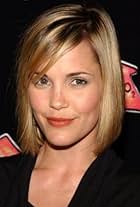
“Maggie Flanigan taught me the true meaning of artistry, passion, and professionalism. I am certain that I continue to work as an actress because of my training with Maggie. At every audition and every performance, her guiding voice is with me. It is a gift beyond measure.”

“Maggie Flanigan is uncompromising, her instincts as a teacher are razor sharp. She doesn’t miss a beat”

“Maggie Flanigan has been one of the most important people in my artistic life. I want to work with Maggie trained actors. As an actor myself, she is my first source. I do not say this lightly, if you are serious about acting, and willing to work very hard, then go to Maggie.”

“Maggie helped me find my sense of truth, an actors greatest asset. Maggie is an expert at instilling that vital ingredient, which allows an actor’s potential to become limitless. My work will forever be rooted in the clarity and honesty she helped me develop.”

“After working for ten years, I did the 2 year program, and now feel that I have the tools I need to become the actor I’ve always dreamed of being. Maggie Flanigan instilled in me a clear sense of truth and a standard of perfection. I am a better actor because of this studio.”

“As an actor, the core of what you have to rely on is your sense of truth and humanity. Maggie allowed me to discover and embrace mine. Trusting my sense of humanity and truth has given me the ability to take risks in my work and my career decisions.”

“Maggie Flanigan has the unique ability to get an actor to the essence of what is true in a moment. She creates a safe and caring environment in which to work.”

“Maggie Flanigan introduced me to my own spirit and my own sense of Truth. Her passion for teaching and ability to communicate are rare gifts to any actor looking for a technique to set his or her talent free. Maggie’s voice has been the one constant guide in my career.”



